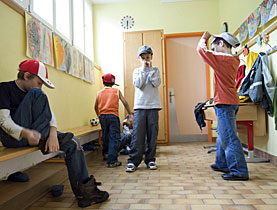
Psychiatrist moots violence screening at school

A Zurich psychiatrist says children are becoming increasingly violent and Switzerland needs to find ways to detect — and treat — troublesome behaviour early.
But his controversial ideas for early detection have been criticised by other mental health professionals.
“I get the feeling: ‘Wake up people, it’s time to think about it,'” youth psychiatrist Hans-Christoph Steinhausen, a retired professor from Zurich University told swissinfo.
“We do get terrible referrals now for severely delinquent behaviour,” he said. “We see it increasing, that it’s increasing in girls.”
Steinhausen says mental health professionals should do more to find potentially violent children at school. To do that, students could be given a survey with questions that could help pinpoint any aggressive tendencies before they are manifested in actions.
“I’m only saying that such screenings could be an option,” he said. “There should be at least some emphasis on early intervention. This approach is terribly missing.”
Steinhausen has criticised the current system of evaluating and treating school children only after they display delinquent behaviour.
Self-fulfilling prophecy?
Other experts are adamantly opposed to his idea of systematic screenings.
“It is extremely problematic because it could easily lead to a child being labelled a problem child who then begins to act like one,” said youth psychologist Allan Guggenbühl.
“You see that with IQ tests. A child is told he has an IQ of 130 and then believes: ‘I am smart so I don’t have to do anything’,” added Guggenbühl who works at the Institute for Conflict Management in Bern and Zurich.
“They’ll integrate that into their identity. It’s naïve to think they won’t.”
The St Gallen School Psychological Service has also raised doubts over Steinhausen’s suggestion.
Hermann Blöchlinger, head of the service, told the 20Minuten newspaper such screenings are unnecessary. “Teachers recognise those few children whose behaviour stands out, and respond with adequate measures,” he said.
Steinhausen, who emphasises that screenings at school should at least be debated, says such a survey would have no ill effects on a child.
“To think it would is foolish,” he said. “Switzerland is always lagging behind in terms of major developments. It takes five years before they wake up. We have to think about this.”
He points to a study carried out in 1994 that looked at severely delinquent behaviour. Some 2,000 students in canton Zurich were asked 150 questions, two of which had to do with fear of school and truancy.
“We showed that some types of delinquency factors are measurable by self-report questionnaires,” he said. “The methodology is suitable for screening at schools. You can do it.”
Controversy
Steinhausen, who served for more than 20 years as the head of Zurich University’s Department of Child and Adolescent Psychiatry, is not new to controversial projects about children and mental health.
He was one of the scientists involved in a study, backed by the Swiss National Science Foundation, which included plans to use children’s genetic material to understand the onset of mental disorders and maladjustment.
That study, launched in 2005 and known as the Swiss Etiological Study of Adjustment and Mental Health (Sesame), came under fire from groups which objected to collecting genetic information from children who would be observed for 20 years, starting from the time when they were a 12-week-old embryo.
Researchers were eventually forced to drop the genetic component of the study. The SFr10.2 million ($9.2 million) project collapsed in March 2008 after researchers were unable to find enough participants.
Youth and crime
Violent crimes committed by children and adolescents in Switzerland over the past few decades have been relatively few, although they are not unknown.
Among those which hit the headlines was a case in Zurich in 2006 in which police arrested 12 minors on suspicion of raping a 13-year-old girl.
According to the Federal Statistics Office, more than 14,000 criminal convictions were handed down to minors in 2006, with 3,300 of them going to children under 14 years old. There were nearly 938,000 minors – between the ages of 7 and 17 – living in Switzerland.
Of those crimes, the most common – 48 per cent – were committed against property, while drug offences counted for 28 per cent. About 17 per cent, or 2,400 convictions, were for crimes of violence. This compares with ten per cent in 1999.
“Screening is something that should be discussed for preventative work,” Steinhausen said. “I’d be happy to discuss it in more detail if there were an arena for it.”
swissinfo, Tim Neville
Police figures show a doubling of reported violent youth crimes in the past decade, but a 2007 Zurich University study suggested the real rate of increase is just 14 per cent.
Researchers believe the police figures are inflated by more people coming forward than before.
The study surveyed 2,693 youths aged 14-15 in the canton in 1999 and compared the results with 2,553 youngsters in 2007.
Each youth filled in a survey anonymously to report the types of crimes they perpetrated or had committed against them, along with details of their social habits.
The results were compared with official police statistics on reported violent youth crime.
The survey showed the worrying statistic that one in four of the 14 and 15-year-olds had been a victim of violent crime in the past two and a half years.

In compliance with the JTI standards
More: SWI swissinfo.ch certified by the Journalism Trust Initiative





























You can find an overview of ongoing debates with our journalists here . Please join us!
If you want to start a conversation about a topic raised in this article or want to report factual errors, email us at english@swissinfo.ch.